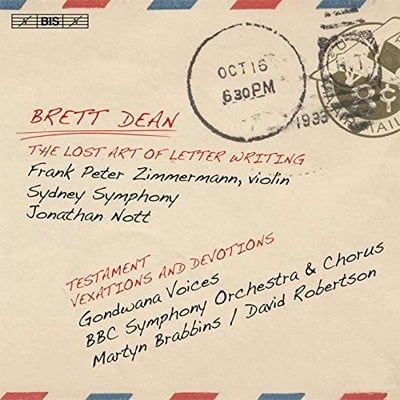Bote & Bock
A project that was mooted some years ago involved writing a piece for strings that in some way related to Beethoven’s life and music. The ideas that evolved following this initial query have since endured and developed. It seemed fitting then to finally realise these thoughts with my former colleagues from the Berlin Philharmonic in mind, a group with whom I have played so much of Beethoven’s music and from whom I have learnt so much. One particularly haunting idea that struck me, on rereading Beethoven’s famous Heiligenstadt Testament, (the last will and testament he wrote comparatively early in life on learning of the irreversibility of his worsening hearing ailments), was the quietly feverish sound of Ludwig’s imagined quill writing manically on leaves of parchment paper.
Beethoven’s 1802 Testament certainly displays the same aspects of his impetuous temperament so readily recognizable from other examples of his (barely legible) manuscripts and other letters. Added to this is a heightened sense of pathos, despair and self pity which makes this such a particularly moving document. "Ah" he writes at one point, "how could I possibly admit an infirmity in the one sense which should have been more perfect in me than in others, a sense which I once possessed in highest perfection…" ("Ach wie wär es möglich daß ich dann die Schwäche eines Sinnes angeben sollte; der bej mir in einem vollkomenern Grade als bej andern sein sollte, einen Sinn denn ich einst in der größten Vollkomenheit besaß…")
Testament begins with sounds of hasty, breathless, but almost silent desperation as the ensemble of violas play their instruments with bows not treated with rosin. Without the usual traction that rosin provides, a rosinless bow glides with an eerie surface noise over the strings, only occasionally and sporadically able to bring out a full tone in the usual manner. Through this way, the main material for the piece is presented almost as if behind a gauze, or as if hampered itself by a hearing ailment. One sees much action, but it is an indeterminate aural experience. The scherzo like character of these scribblings eventually gives way to slower music, led by a high, floating cantilena in the first viola, the shape of which has been informed by a setting of some words from Beethoven’s text, a song with words but without voices. Quotations from the slow movement of his 1st Razumovsky, op. 59 quartet begin to increasingly inhabit the space but are broken off without being able to find cohesion. A sense of loss and alienation remains hanging in the air when, with fully rosined bows in the entire ensemble, the implied anguish behind the music suddenly and ultimately comes to the fore. The ensuing fast music is a fuller development of the opening bars of hushed disquiet, at times outwardly aggressive, at other times again inward and unresolved in its intent, or even unexpectedly light and pliable, including fragmentary references to Beethoven’s flamboyant Op.59/1 finale.
This air of ambivalence remains until the end of Testament (Music for 12 Violas), suspended somewhere between languor and resolve. The time Beethoven spent in the quiet village of Heiligensdtadt outside Vienna, culminating as it did in the realization that his complete deafness was imminent, ironically also marked the beginning of one of the most creative phases in his compositional life, leading quickly to the Eroica Symphony, the Razumovsky Quartets and other thoroughly revolutionary scores. His time in Heiligenstadt then was a leave-taking, an acceptance and a fresh start.
© Brett Dean 2002
Testament was commissioned by the Berlin Philharmonic Orchestra for their chamber music series and is dedicated to the violas of the Berlin Philharmonic "with all my respect, admiration and best wishes".
Reproduction Rights
This programme note can be reproduced free of charge in concert programmes with a credit to the composer
"Testament relates to Beethoven’s desperate document written in Heiligenstadt. Bows without rosin whsiper and scrape like Beethoven’s erratic quill, quotes from the Rasumovsky Quartets and the Eroica flutter past in a shadowy manner, disturbingly like broken fragments in Beethoven’s own failing ears. Dean’s intimate experience with his colleagues, the instrument and the entire orchestra is composed into the work. The twelve instrumentalists, each with independent soloistic voices, sound together more like a hundred. This fascinating, multi-layered portrait-homage to the Berliners and their Beethoven style was the centrepiece of an electrifying concert." (Ellen Kohlhaas, Frankfurter Allgemeine Zeitung, 18 Jun 2003)
"Dean’s Testament touched on Beethovenian profundity." (Sybill Mahlke, Der Tagesspiegel, 13 Jun 2003)

BBC Symphony Orchestra (viola section) / Martyn Brabbins
BIS-2016 (SACD)

